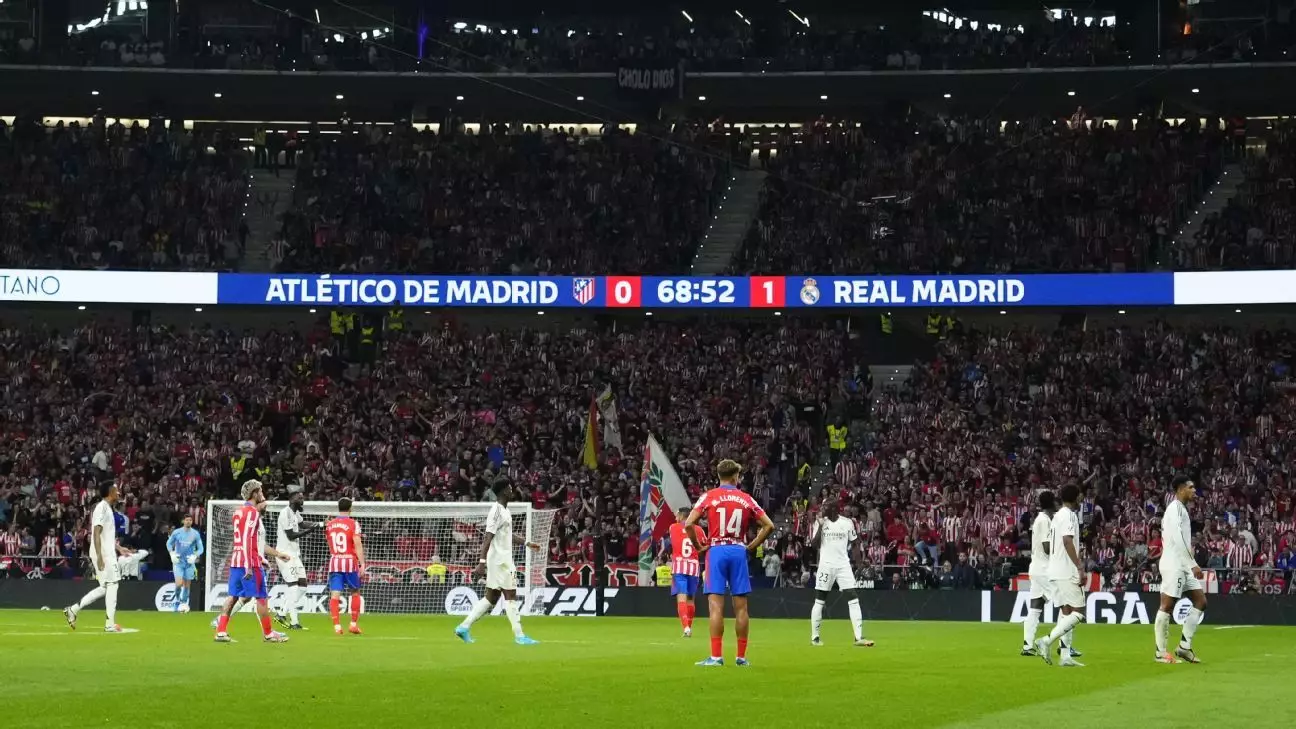The heated rivalry between Atlético Madrid and Real Madrid reached an unprecedented tension during their recent encounter, where what should have been a thrilling football spectacle descended into chaos. As the scoreboard ticked at 68:30, the match was abruptly halted, leaving players and fans in disbelief. What had started as an exciting day of football turned bitter, echoed through the emptying stands and intensified discussions about fan conduct and the broader implications on the game.
On the surface, the inciting incident was Éder Militão’s goal that put Real Madrid ahead. Yet, following this moment, tensions flared as Atlético’s passionate supporters began hurling objects onto the pitch. This reckless behavior targeted Real’s goalkeeper, Thibaut Courtois, a former Atlético player who had celebrated the goal with fervor. The resulting shower of projectiles—lighters, plastic bottles, and other debris—signaled a troubling undercurrent that too many fans seem willing to embrace during such heated matches.
In the face of escalating hostility, referee Mateo Busquets Ferrer demonstrated a commendable level of authority but also faced the challenging task of de-escalating a potentially explosive situation. Initially, the match was allowed to continue after Courtois raised concerns, but it quickly became evident that ignoring the crowd’s actions could lead to greater risk. The ensuing warnings broadcast over the stadium intercom served as a last-ditch effort to calm the crowd, but each warning seemed to further ignite the tension rather than quell it—an alarming sign of the atmosphere turned hostile.
The moment that the referee capitalized on, sending teams to the locker rooms, was emblematic of the struggle for control on the field. This decision may have been unpopular among players eager to contest the game, but it illustrated the referee’s role in preserving player safety. This choice prompted heated discussions among coach Carlo Ancelotti and Atlético’s Diego Simeone, both of whom eventually expressed support for the call. Ancelotti’s reminder that the pause was necessary demonstrated an understanding of the gravity of the situation, while Simeone’s comment on how “nobody likes to stop the game” captured the conflicting emotions of players and coaches alike.
As emotions settled, both Simeone and Atlético captain Koke voiced sentiments that echoed an uncomfortable truth: the need for collective responsibility in navigating such volatile situations. Their recognition that players have a role in mitigating fan reactions speaks volumes about the necessary interplay between players’ actions and supporter responses. It raises a pivotal question: how should players celebrate when they score, knowing that their gestures can provoke passionate reactions from fans—sometimes violently?
Yet, while the players acknowledged their influence, it is perplexing why this line of reasoning is not more commonly discussed. Would a more aware approach to celebrations among players diminish the odds of objects being thrown, or is it a cop-out from addressing the deeper issues at play? The desire to point fingers suggests a culture where accountability is often overlooked, particularly when raw emotions bubble to the surface.
Following the incident, Atlético Madrid’s swift response in the form of a strongly worded club statement was crucial. Condemning the rowdy behavior while vowing to cooperate with authorities was essential in addressing the situation. However, the language of condemnation must also be coupled with a commitment to a larger cultural change—namely, a realization that the ramifications of such acts extend beyond immediate consequences on match day. It affects fan morale, reputations, and ultimately the sport as a whole.
The aftermath of the match was probably the defining moment, as Atlético players made their customary lap of appreciation, only to receive a chorus of whistles rather than cheers from sections of the same fans who had sang passionately just hours before. This division encapsulated a crucial divergence in loyalties: support for a club must exist alongside respect for the integrity of the game and its players. Fans, players, and managers alike must grapple with this balance if we are to preserve the joy of football without the shadow of hostility lurking in the stands.
The events during this derby encapsulate both the passion that football ignites and the dangers it can breed. While rivalries add color and excitement to the sport, there must also be an emphasis on respect and responsibility among all involved. As the dust settles on this particular incident, the conversations it incites must lead to intentional reflections on how to promote healthy rivalries while deterring unruly behavior that tarnishes the game.

